
Humanitarian Nightmare Looms Over Mosul
Sharon Behn
VOA News
IRBIL, IRAQ — Up to a million people are trapped in the Islamic State-controlled city of Mosul. As Iraqi, Kurdish and tribal forces close in, men, women and children are expected to come flooding out. Protecting them will be one of the largest, most complex humanitarian operations in the world.
Kurdish forces are approaching from the east, pushing their front line into IS’s backyard. Iraqi forces are edging up from Baghdad north toward Mosul, slowly taking village after booby-trapped village as coalition jets bomb IS targets.
People are already desperately trying to flee the fighting.
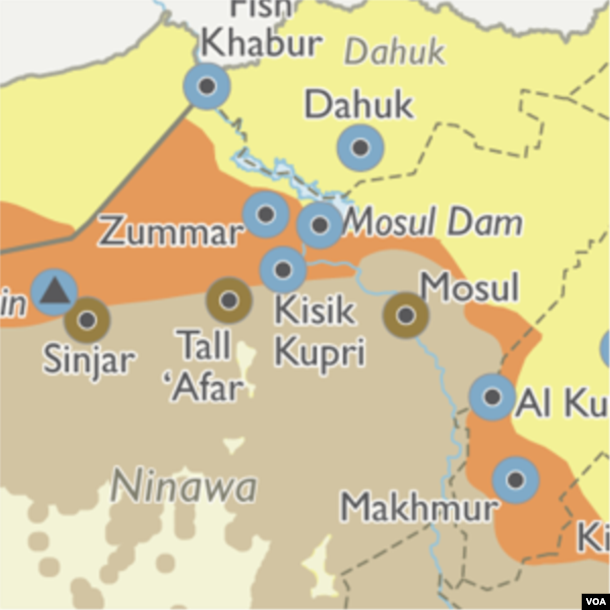
Map detail: Mosul area
Numerous atrocities
According to the United Nations, IS last week captured some 3,000 people trying to escape the fighting south of Mosul. Some are being used as human shields. Some were shot, others blown up, and there are reports that IS burned some alive.
The incident took place near Hawija, just east of the corridor laid out for the thousands expected to flee the looming battle for Mosul.
Families that have managed to escape villages around Mosul are filling up campsto bursting, as humanitarian agencies rush to build more, creating bleak landscapes of off-white tents and grey concrete blocks.
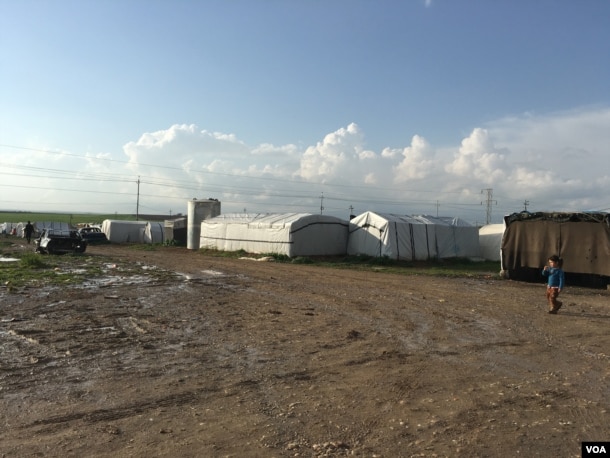
A refugee camp in Kurdistan, April 2016. (S. Behn / VOA)
Adding to their misery is suspicion. Civilians previously fleeing IS were considered victims; the people of Mosul have been living under IS for more than two years and are seen by some as collaborators.
Lise Grande, the UN Humanitarian Coordinator for Iraq, said humanitarian agencies are working to do everything possible to protect the civilians still in Mosul.
“We are doing in depth, detailed planning with the military and civilian authorities,” Grande told VOA.
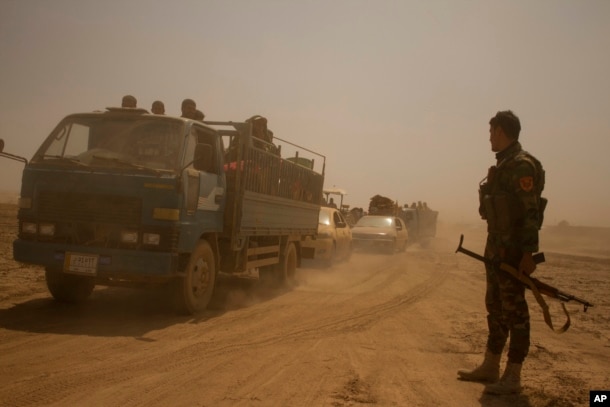
Hundreds of civilians flee villages outside Mosul a day after Iraqi Kurdish forces launched an operation east of Islamic State-held Mosul, Aug. 15, 2016.
Competing interests
Conflicting political objectives of the Baghdad government, the Kurdish Regional Government, and the pro-Sunni former governor of Ninewa, where Mosul is located, have complicated the operation.
“The unstable relationship [between] the central government in Baghdad and the local government will have a main role in creating conflicts,” one Iraqi analyst with a local non-governmental organization working on Mosul told VOA.
“The conflict between the political parties on power [sharing] will also have a negative role on social integration after the liberation of Mosul,” the analyst said, asking to remain anonymous.
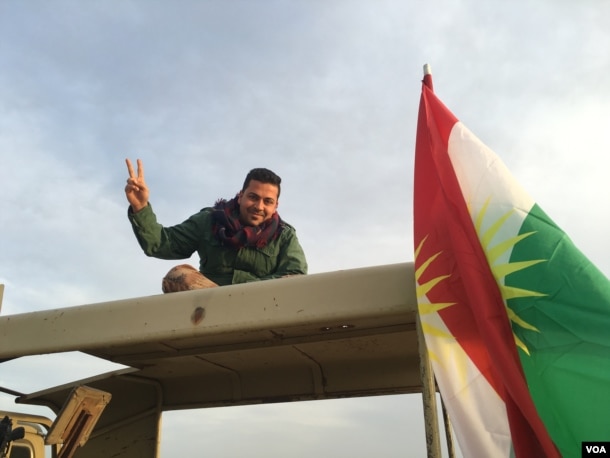
Peshmerga fighter on the Makhmour frontline, Iraq, March 2016. (S. Behn / VOA)
Iraq’s complex political and military divisions mean that the area around Mosul has been “divided” into four quadrants through which civilians would have to travel. Each has its own mix of military and civilian authorities, and its own unique and specific protection issues.
In quadrant one, a crescent moon-shaped area to the east of Mosul, Iraqi Kurdish Peshmerga are the military authority, and the Kurdistan Regional Government is the civilian authority. The KRG has already said it is going to control the movements of those fleeing the violence into this area, so displaced families will be screened, then likely restricted to specific camps.
In quadrant two, a triangle to the northwest of Mosul, the Iraqi Kurdish Peshmerga again are the military authority, while the Government of Iraq is technically the civilian authority. It is unclear how these two authorities will coordinate.
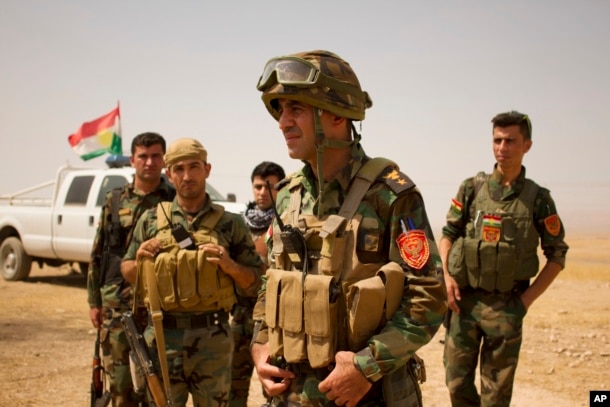
Lt. Col. Arshad Hussein with the 1st Zerevani Brigade at a small outpost outside the village of Qarqashah, Iraq, Aug. 15, 2016.
Myriad protection issues
In quadrant three, a rectangle west of Mosul headed towards Syria, is an area currently under IS control, but is expected to be an active military zone. Civilians fleeing in this direction will most likely be IS supporters, or those fearing revenge killings by Shi’ite militias taking part in the fighting. Protecting these civilians will be difficult.
In quadrant four, a long thin strip following the Tigris River south towards Tikrit, the Government of Iraq will be both the military and civilian authority. Up to 400,000 civilians could use this route to escape the fighting, but authorities are expected to separate the men and boys for security screening at Qayyarah, creating a possible bottleneck.
“Each quadrant, depending on who is in control and what the circumstances are, will have their own specific safety and protection issues that the civilians are going to have to face, and we are going to have to try and help the civilians overcome,” Grande said.
“Right now, as part of our planning, we are discussing arrangements with the Government of Iraq, the Iraqi security forces, the Kurdistan Regional Government, multiple ministries, and four Governors and their administrations,” Grande added.
There also is the question of the Hashd al Shaabi, an umbrella group of Shi’ite militias.
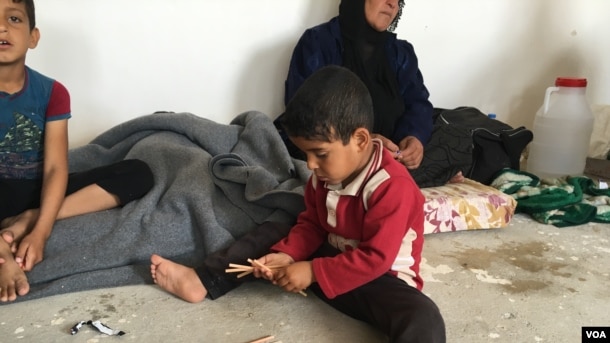
Child displaced by fighting in his village southeast of Mosul. 14 Apr 2016, Makhmour, Iraq (S. Behn / VOA)
The Hashd al Shaabi have been accused of illegally interrogating, and torturing and executing Sunni males during the recent military operation in Fallujah. Iraqi Prime Minister Haider al Abadi has said the government is investigating, but some 1,000 men remain unaccounted for.
According to the Institute for the Study of War, major Iranian-backed Shi’ite militias are already seeking to formalize their participation in operations in northern Iraq. The US-led coalition, Kurdish and Ninewa officials likely will resist letting Shi’ite militias to deploy in the area out of fear of sectarian reprisals.
“There is a huge amount of work going into getting the Hashd al Shaabi to play an appropriate role,” said a Western diplomat familiar with the planning process. “Any kind of retribution, any form of retaliation that is outside the judicial process will make reconciliation that much harder. It is clearly unacceptable.”

A Peshmerga fighter on the frontline, east of Mosul, Iraq, June 6, 2016. (S. Behn / VOA)
Lacking resources
Some officials say there is simply not enough money available to provide food, water, shelter, medical, and sanitation needs for the hundreds of thousands of men, women and children expected to quickly flood into the region and be stuck there, likely for months.
The U.S. and international donors have raised roughly $590 million for the entire humanitarian effort across Iraq. With Mosul expected to add another million to the already 3.3 million displaced in the country, some aid officials believe that is simply not enough.
The Iraqi analyst agreed that the expected refugee situation will require substantial international support, but criticized UN agencies for wasting resources. “The lack of good coordination between all the international NGOs also causes repetition of distribution of relief items to one area, while in other areas there is no distribution,” he said.
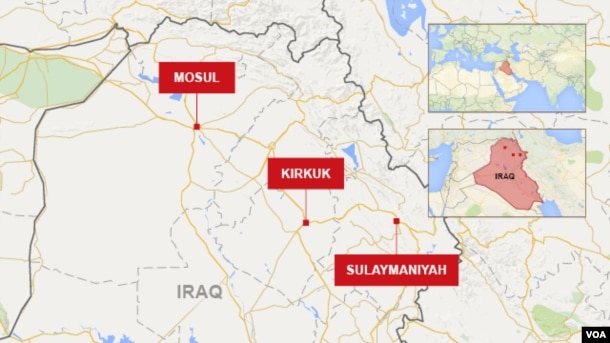
Map of Sulaymaniyah, Kirkuk and Mosul in Iraq.
No one is willing to predict how the military operation in Mosul will play out, or even how the civilians living under the IS extremists will react.
Grande says the UN is asking authorities to do everything possible to protect civilians, control the flow of people leaving Mosul, use military tactics that will result in the fewest number of casualties and ensure that civilians are screened humanely by appropriate authorities.
Yet even if those points are heeded, the assault on Mosul ultimately presents a horrific choice: a fast moving military attack that could potentially cause high casualties or a careful, drawn-out siege, in which tens of thousands could face starvation.

